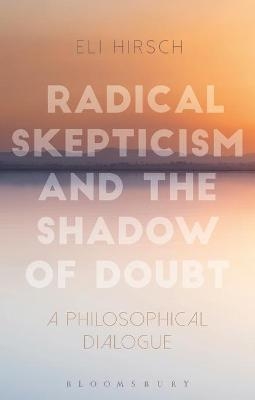
Radical Skepticism and the Shadow of Doubt
Bloomsbury Academic (Verlag)
978-1-350-03384-9 (ISBN)
The book adopts the innovative form of a “dialogue/play.” The three characters, who are Talmud students as well as philosophers, hardly limit themselves to pure philosophy, but regale each other with Talmudic allusions, reminiscences, jokes, and insults. For them the possibility of doubt emerges as an existential problem with potentially deep emotional significance. Setting complex arguments about radical skepticism within entertaining dialogue, this book can be recommended for both beginners and specialists.
Eli Hirsch is Charles Goldman Professor of Philosophy at Brandeis University, USA. He is the author of Dividing Reality (OUP, 1999) and Quantifier Variance and Realism: Essays in Metaontology (OUP, 2011).
Introduction
I. Vatol’s anxiety
Introduction to Lev’s question
The example of Vatol
Yitzhak’s reaction to skepticism, and Williamson’s
On the nature of this work
The “two-level” view of the impossibility of doubt
The meaning of “reasons” to doubt
Relationships between “doubt”, “belief”, “assertion”, and “certainty”
Further connections between “doubt”, “anxiety”, and “knowledge”
Interlude: Waiting for Godot
A connection to Nagel’s skepticism
Interlude: philosophy and comedy
A challenge to Lev’s assumptions about epistemic anxiety
II. Vatol and Us
The n-to-n+1 argument
A safety condition on belief
Interlude: memories of Berkeley
Pryor’s epistemic principle
Distinction between one-level and two-level cases
Interlude: Talmudic connections
The “non-circularity” condition
Daniel ‘s challenges to Yitzhak’s view
Yitzhak’s stringent response to “entering a loop”
Yitzhak’s Austinian answer to the problem of dreams
Interlude: finding an “eitzah”
Daniel’s two additional questions
Summary
Lev’s disagreement with Yitzhak
III. The Impossibility of Doubt
Lev’s past epistemic anxiety
Interlude: Memories from Yeshiva
Lev’s first argument for the impossibility of doubt
The first premise of Lev’s first argument
A question about valuing one’s life on the basis of probabilities
A comparison of Lev’s position with Kant’s and Wittgenstein’s
Interlude: Yitzhak’s tale
Lev’s second argument
The meaning of “having a self”
Interlude: Yitzhak’s pride and shame
Relationship between the notions of “self” and “identification”
Broughton’s suggestion that Hume did not identity with his belief in an external reality
Lev’s epistemic attitude
Endnotes
References
| Erscheinungsdatum | 15.02.2018 |
|---|---|
| Verlagsort | London |
| Sprache | englisch |
| Maße | 138 x 216 mm |
| Gewicht | 440 g |
| Themenwelt | Geisteswissenschaften ► Philosophie ► Erkenntnistheorie / Wissenschaftstheorie |
| ISBN-10 | 1-350-03384-7 / 1350033847 |
| ISBN-13 | 978-1-350-03384-9 / 9781350033849 |
| Zustand | Neuware |
| Haben Sie eine Frage zum Produkt? |
aus dem Bereich

![Was heißt Denken?. Vorlesung Wintersemester 1951/52. [Was bedeutet das alles?] - Martin Heidegger](/media/113619842)
